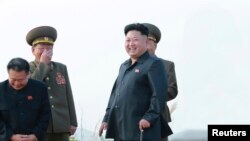North Korea has halted talks with the main sponsor of a U.N. resolution urging the country's referral to the International Criminal Court for crimes against humanity, following months of attempts to win over key supporters of the draft.
In a statement dated Oct. 30 and given to U.N. states, North Korea's U.N. mission said it had suspended talks with the European Union on the resolution.
A U.N. inquiry concluded in a Feb. 17 report that North Korean security chiefs and possibly even Supreme Leader Kim Jong Un himself should face international justice for ordering systematic torture, starvation and killings.
"Although we are not opposed to the dialogue and cooperation for promotion and protection of genuine human rights, we will strongly respond to any attempt to continuously abuse the human rights issues in sabotaging our system, to the last ditch," North Korea's U.N. mission said in its statement, which was obtained by Reuters on Monday.
As of Oct. 31 it suspended "overall consultations" with the EU on the resolution, which has some 50 co-sponsors, and warned that those supporting the move "will have to take full responsibilities for all the consequences."
The resolution drafted by the EU and Japan, which does not single Kim out by name, is likely to be adopted by a U.N. General Assembly committee that deals with human rights as early as next week. It will be put to a vote for approval by the General Assembly in December, where it is expected to pass.
Only the 15-member Security Council can refer the situation in North Korea to the International Criminal Court, but diplomats say China, North Korea's main benefactor, would likely veto such a move. Diplomats said it was unclear if any council members planned to propose a resolution referring the case.
Normally shy North Korean diplomats have sought to sway their U.N. counterparts with their own lengthy human rights report and a proposal for language in the resolution that would praise Pyongyang's record.
North Korean diplomats also recently met with U.N. Special Rapporteur on human rights in North Korea, Marzuki Darusman, for the first time and signaled that they could allow him to visit Pyongyang if language about the criminal court was removed from the draft.
They also told U.N. member states they would consider receiving "technical assistance" from the U.N. Office of the High Commissioner for Human Rights and have human rights dialogue with the EU, according to the statement to U.N. states.
"We're not prepared to make those sorts of deals," said a senior U.N. diplomat, speaking on condition of anonymity.
North Korean officials also made recent visits to Europe and Africa, trips seen as seeking diplomatic support for Pyongyang's efforts over the resolution.
Thin-Skinned, Unpredictable
The apparent end to North Korea's charm offensive at the United Nations came before Pyongyang unexpectedly freed two American prisoners on Saturday in a gesture of goodwill.
North Korea has a long history of being unpredictable and showing indignation, especially when it feels its leader has been insulted.
It recently called off an offer to resume dialogue with South Korea when Seoul refused to stop private groups from launching leaflets into the North that often questioned Kim's legitimacy to rule the impoverished country.
In Seoul, officials said North Korean diplomats had been waging a desperate battle to keep Kim's name off the U.N. resolution, adding the zeal with which they approached the task was an indication of what was at stake for them personally.
"The idea is to keep the supreme leader's name out of it and to try to weaken the language as much as possible," said Lee Jung-hoon, South Korea's special ambassador who represents Seoul at the United Nations on human rights.
"This is perhaps a matter of making or breaking their careers," he told Reuters.
Kim was likely concerned about the impact of being the focus on an international human rights abuse case, added Cho Min of the Korea Institute for National Unification, a South Korean government-run think tank.
"Can you imagine how angry he is about this?" said Cho. "If his name somehow ends up in a resolution, that'll be the end of his hope of meeting [Chinese President] Xi Jinping."





